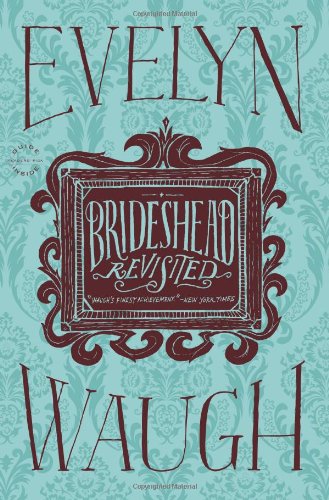I've come late to this classic novel, in part because the work always seemed like it would be something boring to me: the title, the idea that this is about some kind of life among upper-class Brits. And it is the latter, as most of Waugh's is, but it is magnificent.
What do I like about this book? It has a very strong voice, one that beguiles, that ropes one in, as if it were a true-to-life memoir. And secondly, it takes religion seriously--and respectfully--which is not something one sees in a lot of post-1900 fiction.
The story is about one Charles Ryder, an officer in the army who comes upon the Brideshead estate in his work. This is the frame through which the story of the estate--of his relationship with it--is told.
Most of that relationship is with Sebastian, the younger brother of the four children to whom the estate might one day fall. Sebastian and Charles meet at Oxford, where they do as many college students do: they drink and they party. This is the bulk of the first half of this book. It is a story of friendship. And it feels as if it is going nowhere, and yet, as I noted, it beguiles. I was reminded of On the Road, another book about a friendship that has only a loose plot that somehow manages to keep readers hooked. We're not driven to find out "what happens." We just enjoy learning about these young men, sharing in their fun times and enthusiasm for life. And most of all learning about the fun, strange character Sebastian, who carries a teddy bear with him as a friend.
While one can clearly read the story as one of male friendship, there is a subtext of homosexuality going on as well. Some of the friends of the pair are clearly of that persuasion, and at various times we are provided strange asides: the two too naked in a bedroom to come out to see their sister, the two being denoted as not interested in women by other relatives. But Waugh keeps that in the background; his focus is on friendship. This might be a reflection of the time in which Waugh wrote or it might be more that friendship is Waugh's concern here. Or both.
Alas, a plot does kick in. The drunken escapades become more regular, and from here the novel loses some energy as it becomes more and more concerned with Sebastian's alcoholism. Attempts are made to keep him from drinking, and one sees the strain that is put onto a friendship in which one is confronted with wanting to help one's friend in two different ways: giving the friend the freedom he wants but also keeping the friend from destroying himself.
Eventually, Sebastian wanders off into Europe and Africa and drifts apart from Charles, who has become a kind of member of the family. Eventually, Charles is sent to find Sebastian to tell him of his mother's impending death, but such ends up being the climax and end to the friendship. Years later, having moved into a career as a painter and married, Charles meets again Sebastian's sister Julia. The two have an affair, and one has to think that it is in part an unspoken love for Sebastian and for times past that draws them together.
Charles is the lone cynic among the family of Catholic believers. His agnosticism is the point of view from which the novel is written, and thus much of the book is about Charles attempting to understand the family's devotion to Catholicism. It is in this sense that the book takes religion seriously, for rather than dismiss religion, in the end, Charles comes to have an understanding of its meaning.
Waugh, himself a Catholic, thus wrote a Catholic novel. If we take this as being his view of the church, one would see within it a way to stave off or deal with the issues of modernity and death, a way to put order to the world. It's more a feeling than a logic or way of life, insofar as its enacted in the novel, though I'm sure Waugh would see that to be very much logical in itself.
Subscribe to:
Post Comments (Atom)







No comments:
Post a Comment